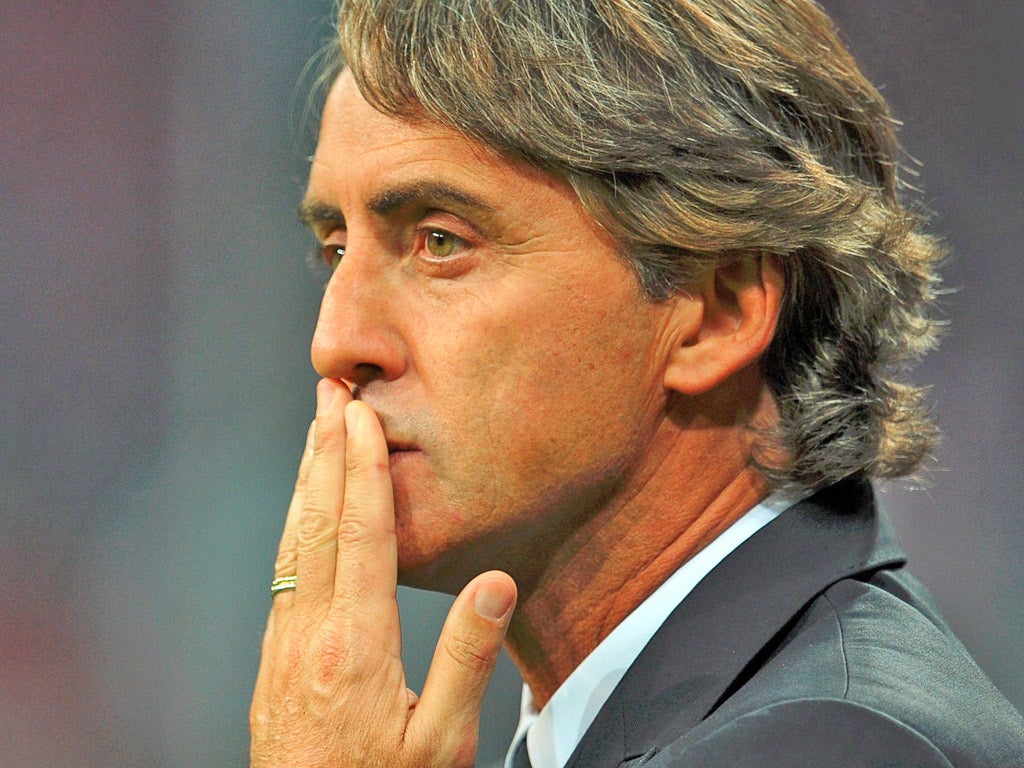James Lawton: City obliged to save the soul of a beautiful game

Your support helps us to tell the story
From reproductive rights to climate change to Big Tech, The Independent is on the ground when the story is developing. Whether it's investigating the financials of Elon Musk's pro-Trump PAC or producing our latest documentary, 'The A Word', which shines a light on the American women fighting for reproductive rights, we know how important it is to parse out the facts from the messaging.
At such a critical moment in US history, we need reporters on the ground. Your donation allows us to keep sending journalists to speak to both sides of the story.
The Independent is trusted by Americans across the entire political spectrum. And unlike many other quality news outlets, we choose not to lock Americans out of our reporting and analysis with paywalls. We believe quality journalism should be available to everyone, paid for by those who can afford it.
Your support makes all the difference.Manchester City may be unlikely vigilantes for the sane governance of modern football but what happened in the Allianz Arena in Munich this week has surely left them with precisely this unavoidable option.
They have to batter their way through the fog of legal jargon and mealy-mouthed advocacy of compromise which yesterday threatened to envelop the shocking behaviour of Carlos Tevez when he rejected his manager Roberto Mancini's order to play in the second half of the Champions League game with Bayern Munich.
With perhaps vital help from the most callous lawyers they can find, they have to heap maximum inconvenience on the player who so cold-bloodedly made nonsense of the concept of trust and loyalty in football.
They have to do it not out of revenge or anger, or any attempt to retrieve the many millions of pounds they have invested in a career which virtually from its inception has explored the very limits of acceptable practice.
No, the obligation is to do it with the sober understanding that if Tevez goes unpunished to any significant degree, City have not just let down themselves, and horribly compromised the meaning of who they are and what values they represent, but the game they have sought to dominate with unprecedented levels of spending.
Tevez and his people are now urging us to believe that what we saw in Munich was not an act of petulant rebellion, in circumstances most guaranteed to undermine his club and his manager and his team-mates, by a player who is paid more than £200,000 a week, but a "misunderstanding".
It is another insult not just to the intelligence but the instincts of anyone who still wants to believe that big-time football is about something more than relentless self-interest. Mancini, a man of vast experience as a player and a manager, said that Tevez's refusal to play was quite unambiguous and that it was something that he would never be able to accept.
Some may say that we are in danger of exaggerating the degree of Tevez's crime.
It is true that in the last year or so players like Javier Mascherano and Luka Modric said that the possibility of transfer deals had made it difficult for them to play for the clubs who were still paying their wages. It is also right that this time last year Wayne Rooney delivered an ultimatum to Manchester United that in some ways was as sickening as Tevez's stance this week.
Rooney lectured his manager Sir Alex Ferguson on the need for more ambition in the transfer market and demanded a major hike in his wages despite the fact that never before had he played so wretchedly.
United buckled with shameless speed, some of us argued, but what they did receive, bit by bit, was some quite spectacular atonement. Could City hope for such reparation from Tevez before unloading him to a club who might just help them cut their losses in the next transfer window? It should be an academic question. Rooney didn't cross the line that Tevez traversed when Mancini told him to play.
It was, as Graeme Souness pointed out to the nation with ferocious conviction, the decision of a man who put no value on anything beyond his mood and inclination of the moment. It was a face of football that was utterly unacceptable.
Meanwhile, Gordon Taylor, chief executive of the Professional Football Association, advocates a meeting between City's director of football Brian Marwood and chairman Khaldoon al-Mubarak. He says that City have an inherent problem after recruiting large numbers of high-profile players who earn vast salaries and are likely to become restive if they have to spend time on the bench - and that perhaps they might settle for a full apology from Tevez.
The trouble with such sweet reason is that it could leave Mancini stripped of all authority. He said, almost with a shudder, that he could never accept what Tevez had done.
It was the death of football as he had always known it, as a perfectionist player and a manager with an implacable belief in the authority of the man who picks the team.
Tevez nonchalantly made a mockery of that underpinning of all significant success in football. He was a man who had grievances – and all of them were too important to put aside when he was asked to fulfil his professional duty.
It means that the ejection of Tevez is plainly the most compelling priority.
When he said he was the victim of a misunderstanding he was in just one sense right. The confusion lay in Roberto Mancini's belief that when all the history was put to one side he might just still be dealing with the vestiges of a decent professional.
He knows better now – and so should Manchester City.
Join our commenting forum
Join thought-provoking conversations, follow other Independent readers and see their replies
Comments